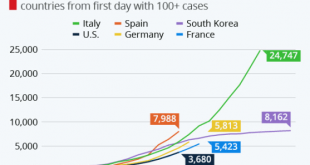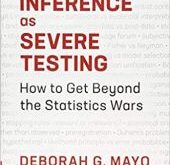Read More »
Option value
Like most of us, I’m not expert on epidemiology. But I have spent most of my life studying risk management. In the current crisis, one of the most relevant issue,s and the one that policymakers seem to be ignoring is that of option value. To see what’s involved, consider a policy choice like shutting down bars and cinemas, as opposed to waiting two weeks to see what happens. If, in two weeks time, it turns out the virus has been contained, the ban can be reversed and the loss is that...
Read More »How is the Consumer Society Doing?
The rich, the wealthy, the privileged have to provide for themselves? What, no dog walkers, no maids, no waiters and all the other little people that make life a joy? Gardners, bus drivers, private nurses, second houses in the Hamptons, a third house in Hawaii–all cared for by the loving poor? Cutting interest rates no longer primes the pump? Neo-liberalism on its last legs? What is going to happen when climate and ecological disruption really hit? And...
Read More »Coronavirus: upward trajectory or flattened curve?
Machine learning — puzzling ‘big data’ nonsense
from Lars Syll If we wanted highly probable claims, scientists would stick to low-level observables and not seek generalizations, much less theories with high explanatory content. In this day of fascination with Big data’s ability to predict what book I’ll buy next, a healthy Popperian reminder is due: humans also want to understand and to explain. We want bold ‘improbable’ theories. I’m a little puzzled when I hear leading machine learners praise Popper, a realist, while proclaiming...
Read More »Videopresentation invitation
I didn’t get a lot of responses to this invitation back in 2008, but I’m hoping for more now. I can offer video presentations on a wide range of topics (climate change, water, infrastructure, digital economy & culture, employment and macro policy in general, among others). As regards technology, it seems that Zoom is state of the art now. I’m hoping to have that set up so I can do it from home, which will allow more flexibility about time. Repost from 2008 With the release of the...
Read More »Prepare for the coronavirus global recession
from Larry Elliot in The Guardian Travel bans. Sporting events cancelled. Mass gatherings prohibited. Stock markets in freefall. Deserted shopping malls. Get ready for the Covid-19 global recession. Up until a month ago this seemed far-fetched. It was assumed that the coronavirus outbreak would be a localised problem for China and that any spillover effects to the rest of the world could be comfortably managed by a bit of policy easing by central banks. When it became clear that Covid-19...
Read More »Statistical models for causation — a critical review
from Lars Syll Causal inferences can be drawn from nonexperimental data. However, no mechanical rules can be laid down for the activity. Since Hume, that is almost a truism. Instead, causal inference seems to require an enormous investment of skill, intelligence, and hard work. Many convergent lines of evidence must be developed. Natural variation needs to be identified and exploited. Data must be collected. Confounders need to be considered. Alternative explanations have to be...
Read More »Economic Response to Pandemic: Go Big, Go Fast
The health emergency created by the COVID-19 pandemic is of course the primary concern of Canadians, and the first priority for government to address. But it is increasingly clear that the economic fallout from the pandemic is also going to constitute an emergency. And it requires government to respond as urgently and powerfully in the economic sphere, as they are attempting for public health. I was invited onto CBC Radio’s special broadcast today to discuss the economic consequences...
Read More »Economic Response to Pandemic: Go Big, Go Fast
The health emergency created by the COVID-19 pandemic is of course the primary concern of Canadians, and the first priority for government to address. But it is increasingly clear that the economic fallout from the pandemic is also going to constitute an emergency. And it requires government to respond as urgently and powerfully in the economic sphere, as they are attempting for public health. I was invited onto CBC Radio’s special broadcast today to discuss the economic consequences...
Read More » Heterodox
Heterodox



